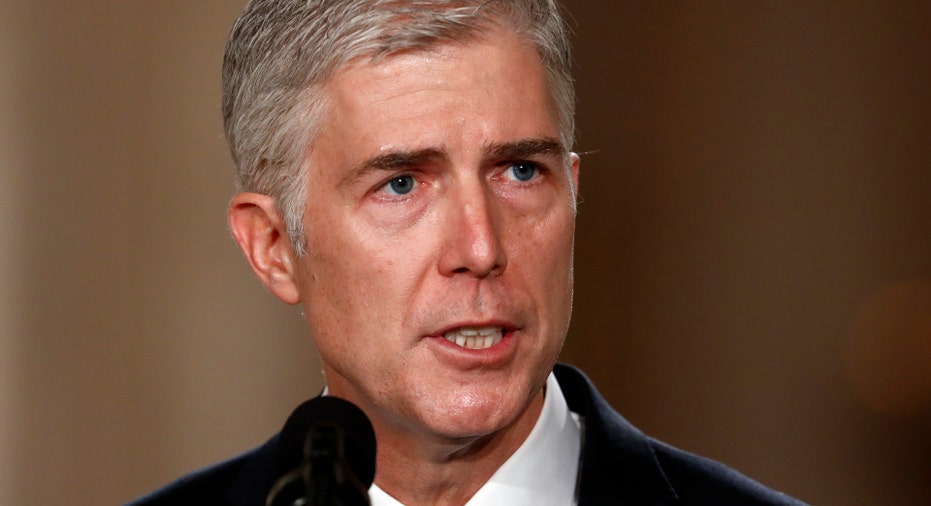Trump's Supreme Court Pick Gorsuch Faces Questions on These Key Issues

The confirmation hearing for President Donald Trump’s Supreme Court nominee, Judge Neil Gorsuch, began Monday and Senate Democrats are prepared to put him through the ringer. While Republicans have lauded Trump’s pick, who, like Justice Antonin Scalia, favors a strict interpretation of the Constitution, Democrats have been busy organizing their line of attack. FOX Business took a look at the top four key issues Democrats are likely to press Judge Gorsuch on this week.
Abortion
“I’m sure they’ll probe him on abortion, about which he’ll say very little because he hasn’t ruled on such a case and won’t give a preview on how he’d rule,” Ilya Shapiro, senior fellow in constitutional studies and editor-in-chief of the Cato Supreme Court Review at the Cato Institute, told FOX Business.
President Trump promised to nominate a pro-abortion judge throughout his campaign, and Democrats want to know where Gorsuch stands. While he has never ruled overtly on the issue, some believe his stances on other cases are telling.
In Hobby Lobby Stores Inc. v. Sebelius, Judge Gorsuch ruled against the Affordable Care Act’s contraceptive mandate, which requires private employers to provide employees with free contraceptive coverage. Gorsuch sided with the company, which argued the mandate violated its religious beliefs.
In addition, he laid out the perspective in his book "The Future of Assisted Suicide and Euthanasia" that assisted suicide violates the right to life.
Campaign Finance Laws
Citizens United v. FEC was a controversial Supreme Court case dealing with the regulation of campaign expenditures by organizations. The Court ruled in a 5-4 decision that laws restricting independent political spending by corporations and unions were unconstitutional because they prohibited free speech.
Critics of the ruling believe corporations should not be granted the same rights to free speech as individuals and that it has given a larger voice to the rich. The decision has led to the rampant rise of super PACs and political non-profits.
When it comes to where Gorsuch stands on Citizens United, Shapiro thinks he will “explain the importance of protecting the right to political speech,” which would indicate he is in favor of upholding the ruling.
Worker Protection
Last week Senate Minority Leader Chuck Schumer held an event with citizens on the losing side of some of Gorsuch’s Tenth Circuit appeals decisions, whom he argued were decided against in favor of “big, special corporate interests.”
In one case, Hwang v. Kansas State, the court, and Gorsuch, ruled against a university employee who sued the school for refusing to extend her six-month leave of absence after she underwent cancer treatment, and did not want to return to work as a flu epidemic broke out on campus.
In another case, TransAm Trucking Inc. v. Administrative Review Board, it was determined a trucker had been wrongfully fired after he unhitched his trailer and drove away when the truck’s brakes froze. Gorsuch dissented, saying the company had given him the legal option to stay with his trailer and wait for help, which he declined, instead operating the truck in a way not permitted by the company.
Supporters will point to the fact that Gorsuch is not evaluating moral arguments, simply legal ones. As Gorsuch himself noted in the latter opinion: “It might be fair to ask whether TransAm’s decision was a wise or kind one. But it’s not our job to answer questions like that. Our only task is to decide whether the decision was an illegal one.”
Religious Freedom vs. the Law
In addition to the Hobby Lobby case, Gorsuch sided with the Little Sisters of the Poor, defending the religious right of nuns not to have to pay for contraceptive drugs under their health care plans.
Democrats are likely to question Gorsuch on what critics view as a broad interpretation of the Religious Freedom Restoration Act, which ensures religious freedoms are protected.
Will Republicans Go Nuclear?
Schumer has threatened to use his influence in Congress to block any Trump nominee who is “not bipartisan and mainstream.”
Last week, Senator Schumer doubled down on claims that Judge Gorsuch is not the right man for the job: “Neil Gorsuch may act like a neutral, calm judge, but his record and his career clearly show he harbors a right-wing, pro-corporate, special-interest agenda,” he said during a press conference.
Still, while Republicans have expressed willingness to invoke the nuclear option if necessary, Shapiro said they may not have to.
“I’m not convinced that Schumer has the votes to sustain a filibuster, particularly given that there’s nothing extreme about Gorsuch and that 10 Democratic senators are up for reelection next year in states that Trump won. But if push comes to shove, I’m confident that [Sen. Mitch] McConnell would indeed eliminate the filibuster for Supreme Court nominees,” he said.
Many Democrats are still upset with the GOP's treatment of President Obama’s Supreme Court nominee, Chief Judge Merrick Garland, who Republicans refused to consider at the time.
Judge Gorsuch’s hearing comes 48 days after his nomination, though for the last three successful Supreme Court appointments, the confirmation process took an average of 78 days from the time of nomination.



















